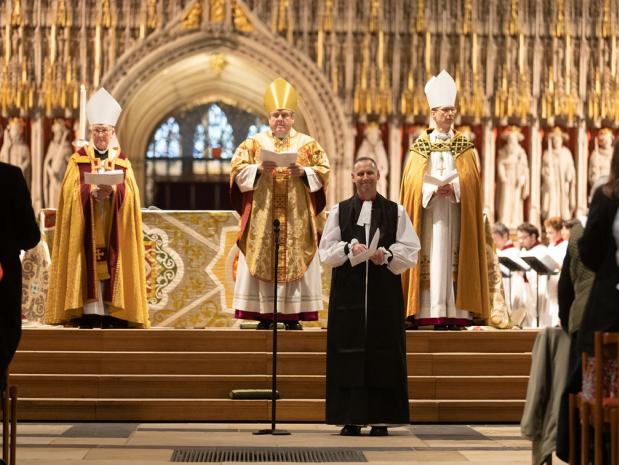Gallery of Photos
Video of the Service
Order of Service
Isaiah 52.7-10
Psalm 19
Romans 10.12-18
Matthew 4.18-22
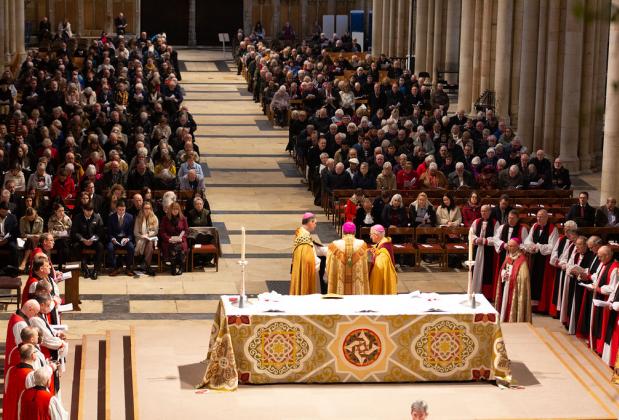
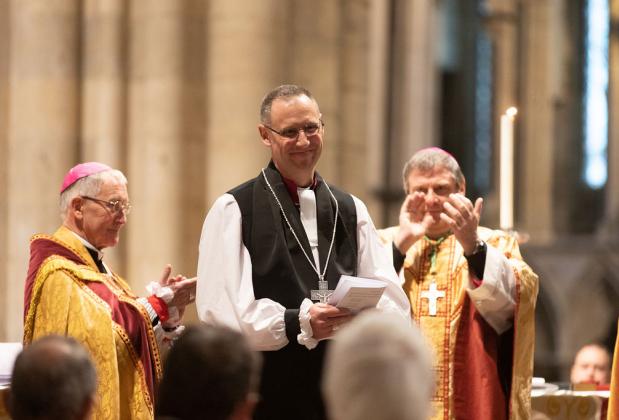
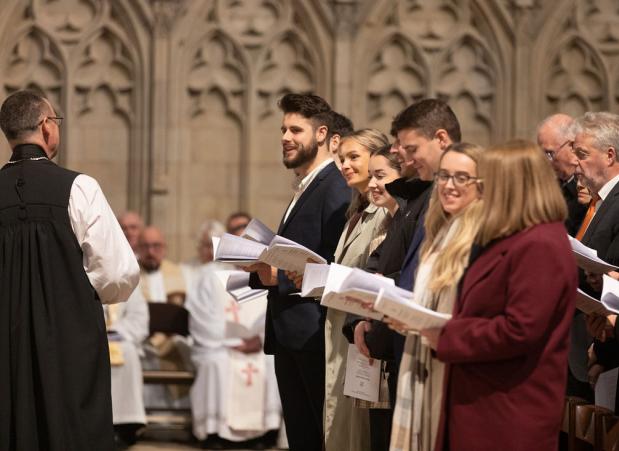
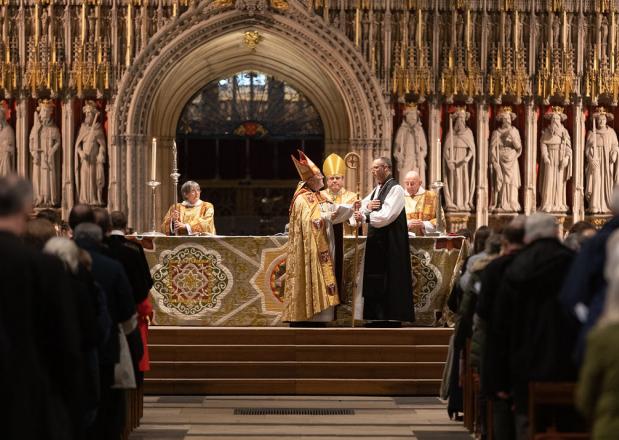
Sermon by The Rt Revd Dr Martin Warner SSC, Bishop of Chichester
Let’s take a bit of time to think about feet.
The wife of one of my colleagues has recently given birth and tells me she is delighted to see her feet again. And a predecessor of mine in Chichester was unable to move away from the city in retirement because the one person who mattered to him above all others, even his wife, was his podiatrist.
Feet are the limbs furthest from our attention, until they hurt. On the whole we don’t expose them in polite society, preferring to keep them covered, sometimes at considerable expense. Yes, Gucci can look great but be bad for your pocket; it can also be damaging to your spiritual health.
The state of our feet, especially in the grimy streets of our industrial towns and cities, grieved the 19thcentury Jesuit poet, Gerard Manley Hopkins. He reflected on how human labour seemed to disconnect us from nature and to damage the environment, noting that ‘All is seared with trade; bleared, smeared with toil…the soil is bare now, nor can foot feel, being shod.’
This might seem at odds with Isaiah’s description of the beautiful feet upon the mountains, quoted by St Paul in his letter to the Romans. St Paul seems to be quoting from memory and, as is often the case, there is a slight difference between the New Testament quotation and the Old Testament original.
Isaiah uses a Hebrew word, tov, that describes the feet as ‘good’: good feet bringing good news. It might not sound as lyrical as St Paul’s version, but it is, perhaps, more powerful in its significance.
The Hebrew word for ‘good’ describes what God sees with delight, when God calls creation into existence. Again and again we hear that God sees what God has made and it is ‘good’.
In the Hebrew Scriptures, the good news of justice and hope and peace is drawn from the experience of being in the presence of God, and most especially through the worship of God in the Temple in Jerusalem. ‘I was glad when they said unto me: we will go into the house of the Lord. Our feet shall stand in thy gates, O Jerusalem…Yea, because of the house of the Lord our God: I will seek to do thee good.’ (Ps 122.1,9)
Stephen, a significant aspect of the ministry that lies ahead of you will demand that you become an apostolic traveller, like St Andrew, bringing Jesus to people and people to Jesus; going into the house of the Lord, wherever it is located, in communities across the north of England in order to strengthen and encourage the people of God in their vocation to be missionary disciples of Jesus Christ.
The liturgical worship of God is a treasured aspect of our identity in the Church of England and it will be your task to ensure that this inheritance retains its imaginative intelligence and life-giving quality in a secularised culture that can often be hostile and suspicious of the practice of faith.
Central to our identity as Anglicans is a commitment to open churches offering public worship. This is drawn from the very meaning of the word, ‘liturgical’. It is a public work, not merely an activity for the like-minded, nervously guarded behind closed doors, fearing challenge and engagement with the unbelieving world for which, let us remember, out of love, Jesus Christ gave his life that all might live.
The mandate for our worship has already been clearly stated: it is to ensure that with confidence and joy, the Church in each place and time is united with the Church in every place and time. The social consensus of the day does not determine the convictions and identity of the assembly of the Church in its worship and doctrine, but it does present the context with which we are called to proclaim the gospel afresh, attuned to the language, preoccupations, questions and anxiety of our time. We should cherish the obligations of compassion and humility that ensure our words will be intelligible and authentic as good news for those, both within and outside the Church, who hear them.
The oath of canonical obedience, now etched into my memory in a way that I would never have expected, speaks of the use in public worship of what is authorised or allowed by Canon. It is a phrase that some might regard as a limiting legalism. That should not be so. In the Orthodox tradition, the serving together in a common liturgy is an emblem of communion. But it is more: the words of the liturgy, shaped by holy Scripture that the living tradition, are also a source from which the Orthodox draw much of their doctrine.
We are not so different. The sacred texts we use in our worship of God give us words with which to offer the sacrifice of praise and thanksgiving. These authorised words also define the freedom and the limits of theological conviction that belong within the spectrum of the Church of England’s theological identity, while at the same time they commit us to a pattern of behaviour and service that put words into action.
‘Because of the house of the Lord, I will seek to do thee good.’ This phrase sums up the close relationship between worship and social outreach, love of God and love of neighbour.
Stephen, many of the parishes entrusted to your pastoral and sacramental care will present the stark challenges of inequality in the life of our nation today – a reality with which you are already familiar.
The sense of dislocation in Hopkins’ poem lurks beneath the surface of our technological age. These parishes you will serve are the treasure that is now entrusted to you. They are the places and people who are our teachers because they speak to us of the essential pattern of God’s self-revealing in need and vulnerability.
Wherever, and in whatever way, you kneel to wash the feet of those you serve, you will reveal the sacramental life of the Lord himself, who, with the power of the Holy Spirit, marks out these women, men and children to be his friends, his ambassadors, and his agents of the gospel among those whose life those people share.
Foot washing is itself more than a symbol. It directs us to the issue of our carbon footprint, in a way that Gerard Manley Hopkins would have understood, and it takes us right back to God’s vision of good in creation.
Good feet bringing good news will not only engage with the global issues of power, greed, inequality and damage to the environment: they will also be instrumental in recovering joy and laughter, subversive gifts that challenge human pride. Good laughter, godly laughter, is the vindication of God’s promises.
Both Abraham and Sara (Genesis 17, 18) knew this laugher to be a sign of the transformative power of God, and the Psalmist sees it reflected in the good ordering of creation: sowing in tears but reaping in joy (Ps 126), as the valleys themselves stand so thick with corn that they shall laugh and sing. (Ps 65.14).
This good laughter echoes through the pages of the Scriptures and breaks into song in the Church’s daily worship. Mary is the traveller who carries this good laughter and shares it with Elizabeth in the Magnificat, good feet bringing good news, celebrated by God’s women in good laughter.
Let these women, and especially the companionship of Mary, Mother of Jesus, Mother of the Church, and our Mother too, be a source of joy and hope for us all, and especially for you, Stephen, as you set out with good feet to bring the transformative power of the good news of Jesus Christ to the people of this Province, living always in the joyful, confident expectation of the dawn and resurrection, which is where Hopkins directs us in conclusion to his poem on God’s Grandeur:
And for all this, nature is never spent;
There lives the dearest freshness deep down things;
And though the last lights off the black West went
Oh, morning, at the brown brink eastward, springs –
Because the Holy Ghost over the bent
World broods with warm breast and with ah! bright wings.
Photo credit: Duncan Lomax

